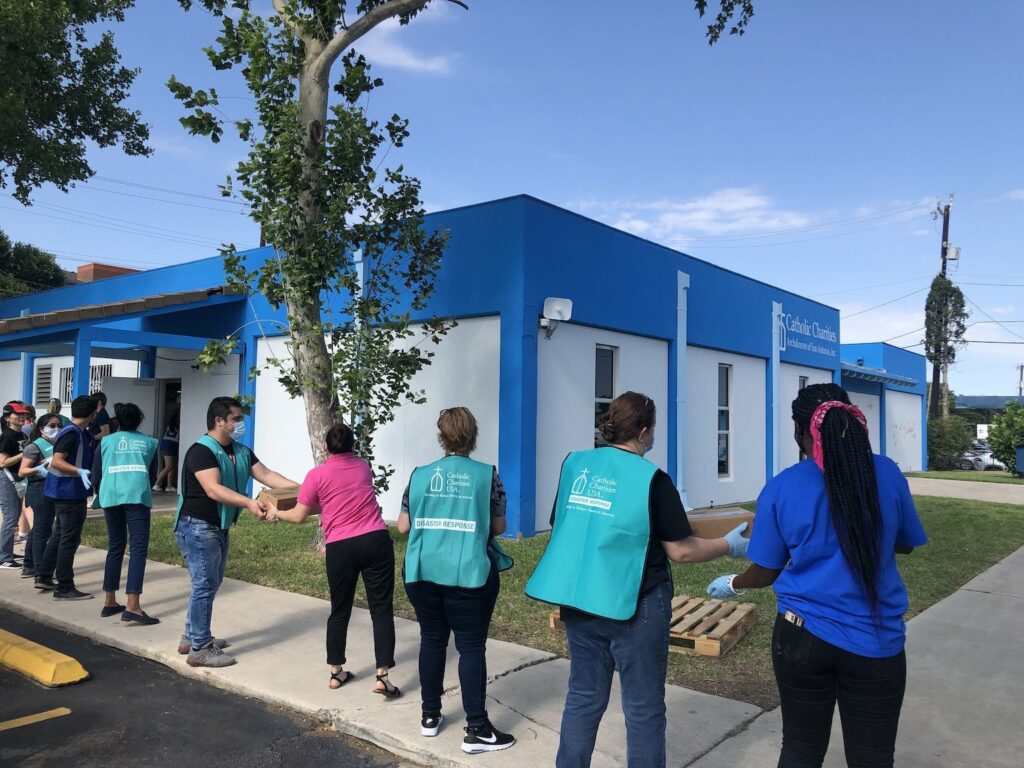SAN ANTONIO — As the U.S. took in almost 19,000 migrant children, labeled “unaccompanied minors,” in March, faith-based organizations such as Catholic Charities throughout the U.S. have been doing their part to help.
In Texas, Catholic Charities of the Archdiocese of San Antonio set up over 2,000 cots for their guests at the Freeman Coliseum to “welcome and care for unaccompanied migrant children,” the organization said March 30 on its website.
Staff as well as volunteers from local churches have assembled hygiene kits of toothpaste and soap to give to minors who have been allowed into the country at its southern border with Mexico and are waiting to be reunited with family or who will soon go live with sponsors.
“It is a privilege to serve the community and an honor to help as much as we can these children who have been separated from their parents for some time, especially in a country that is not their own,” said Antonio Fernandez, president and CEO of San Antonio’s Catholic Charities.
“While I understand that this could be considered a political issue for many, it is strictly a humanitarian one to us at Catholic Charities,” he said.
Such scenes are not foreign to agencies such as Catholic Charities and other Catholic organizations that have engaged staff and volunteers to help in the past.
In 2018, when migrant children were separated from their families by Trump administration policies that were later reversed, the U.S. Conference of Catholic Bishops’ Migration and Refugee Services, Catholic Charities USA and a network of other agencies from around the country stepped in during family reunification efforts.
In the case of Catholic Charities of San Antonio, the agency said it had extended its services after a conversation with the Federal Emergency Management Agency and the U.S. Department of Health and Human Services.
From advocacy, such as denouncing harmful policies in the halls of government, to providing basic food and care, Catholic organizations have long been sought out by administrations from both parties and actively participated in making sure migrants and their families have the best possible chance at staying together.
Both political parties, in fact, have sought the help of the Catholic Church, mostly because of its vast network of humanitarian agencies.
In 2018, MRS executive director Bill Canny, told Catholic News Service that the HHS Office of Refugee Resettlement, which has the responsibility of releasing unaccompanied children from federal custody, reached out to the Catholic organizations, as well as the Lutheran Immigration and Refugee Service and other agencies to help with family reunification.
It’s a task the Catholic groups, along with other faith-based organizations, have been eager to take part in — in a bipartisan manner.
“Protection of families is a foundational element of Catholic social teaching and this moment calls on all people of goodwill to lend a hand to reunite these children with their parents,” MRS and Catholic Charities USA said in a joint statement in 2018 during a crisis that year involving the separation of children from their families.
With the COVID-19 pandemic, Catholic leaders say that task has become even more important since the agencies aren’t just trying to reunite families but also trying to keep them safe from the highly contagious coronavirus, which has changed their protocols for assisting migrants.
Because Border Patrol has not been screening incoming migrants, Catholic Charities of the Rio Grande Valley in McAllen, Texas, has contracted health care workers to screen and test migrants, separating those who test positive from the rest and providing a place to quarantine for those who have the virus.
In San Antonio, incoming children have been received with the essentials, food and a place to sleep and shower, but also toys, soccer balls and stuffed animals, something to remind them that they’re children, until they can find their families or someone else can care for them.
“Kids are kids regardless of where they live,” said Fernandez. “I can never stop thinking about my daughter in a place like this, and the thought moves me to try harder to be the best for these unaccompanied children.”

